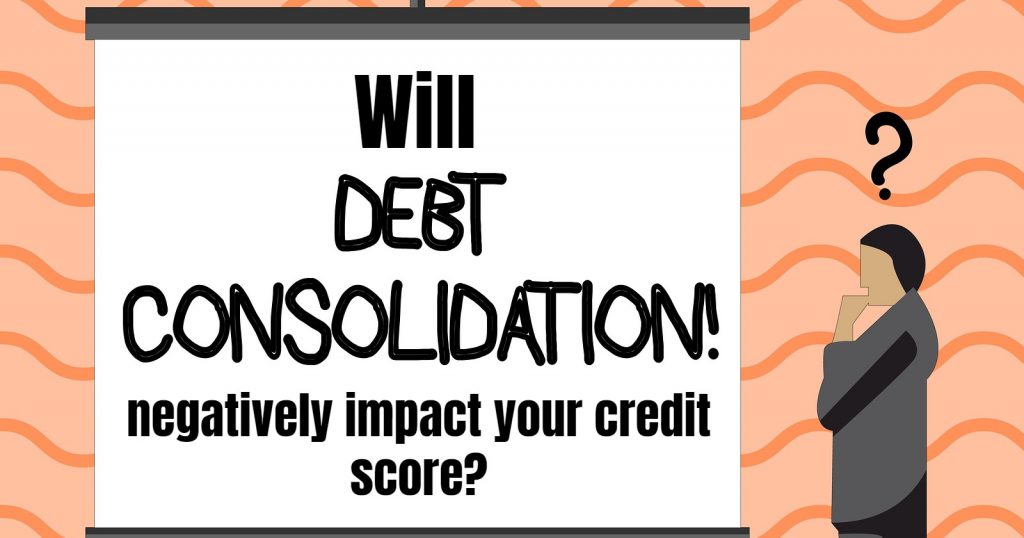
Most people who are in debt want an affordable way to pay it off either quickly or over an extended period of time. Debt consolidation is a common solution, and there are two ways to go about.
Debt consolidation loans are the first options that comes to mind. A debt consolidation loan is a personal loan taken out with the purpose of paying off several other debts and getting them all in one place. Making it easier for consumers as they pay off one loan with one interest rate and monthly payment rather than having to manage multiple payments and varying due dates. Another way is to take out a balance transfer credit card and pay off credit card debt with it; you are also left with one obligation, interest rate, and monthly payment on a revolving line of credit.
Either option has its benefits and downsides, but more importantly, both will have an impact on your credit score. If it’s going to affect your credit, the first question to ask is how.
Many consumers think debt consolidation may have a negative impact on credit. To be fair, this is both true and false. Debt consolidation can either help or hurt your credit, but it depends on how consumers manage their obligations. For starters, let’s talk about how debt consolidation may hurt your credit.
How Can Debt Consolidation Hurt Your Credit? There are a couple of ways debt consolidation can drop your credit score.
For starters, consolidating with a balance transfer card or personal loan requires you to apply for a new credit account (either revolving credit or installment credit, respectively). In either case, lenders must pull your credit report while underwriting. This leads to a hard credit inquiry which can temporarily bring your credit score down by several points.
A minor credit score reduction is standard practice during credit applications that require a hard credit inquiry. It must be noted this reduction should be temporary, but at any rate, your credit score will still drop.
Some debt consolidation lenders require you to close the various accounts you are consolidating which can result in a drop in your credit score. Because this will likely increase your credit utilization ratio as your available credit may decrease. If they do not require you to do this, the biggest risk with a debt consolidation is mismanaging your new credit account. Although consolidating debt is supposed to make things easier, you are still required to make timely payments. The debt doesn’t go away. If you miss payments, you can expect this to have a negative impact on your credit. As mentioned, this is a significant risk, but it isn’t a new problem. Missed payments are a constant risk for any type of debt, and they will always have an averse effect on your credit.
Also, if you don’t get a solid spending plan or budget in place, you may resort to having to use the credit cards you consolidated again and end up back where you started, or worse with even more debt.
Why It Should Pay Off In the Long Run
Although hard inquiries and missed payments can reduce your credit score, there are positive effects on credit to consider.
The biggest risk is missing payments, but making your payments on time is one of the greatest benefits to debt consolidation. Paying off debt religiously over time is viewed as a positive signal by credit reporting agencies, and this should improve your credit score over time. Remember the whole point of debt consolidation is to pay off expensive debt more effectively and more easily. If you’re committed, then you stand to improve your credit moving forward.
Second, consolidating credit cards with a personal loan can drastically reduce your credit utilization ratio. Having high credit card debt on multiple cards often results in a high credit utilization ratio which is viewed as a detriment to credit score. By transferring your revolving debt to installment debt, you will open up your credit limit and reduce the utilization ratio. This could improve your credit score! (Be sure to check with the lender to see if they will require you close or if these accounts will be able to stay open.)
Additionally, if you haven’t had many loans in the past, taking out a personal loan for debt consolidation may also improve your credit mix. Different types of credit accounts, such as installment or revolving credit, are reported to the credit bureaus, and it’s seen as a good sign to have a mix of credit. If you add installment debt to your credit mix, then it may improve your credit score.
Conclusion
The stigma surrounding debt consolidation and sinking credit scores is not altogether unwarranted. However, the hard inquiries placed on your credit report are a temporary hit, and emphasis should be placed on paying back debt diligently. In the long run, debt consolidation may improve your credit by way of a strong payment history, a new credit account added to the mix, or lower credit utilization ratio. Focusing on these positive outcomes of debt consolidation should be the aim when it comes to improving your credit.
Andrew Rombach is a Content Associate for Lendedu – a website that helps consumers and small business owners with their finances.

